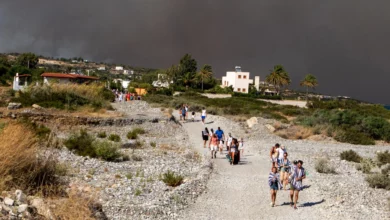ATHENS – Greece has enough money to pay pensions, salaries and bondholders through mid-November, the finance minister said Tuesday, as global markets sank on worries that a messy default could bring down European banks and trigger another global recession.
The Athens stock index was down more than 6 percent by late afternoon while the main Europe markets fell more than 3 percent. The turmoil endangered French-Belgian bank Dexia, whose shares plunged as much as 40 percent, on worries about its exposure to Greek bonds.
Greece had previously said it would start running out of money in mid-October if it didn't get the next 8 euros billion installment of the 110 euros billion rescue package it has been relying on since May 2010.
Evangelos Venizelos sought to reassure Greeks and investors that the country can hold on a little longer while its rescue creditors decide whether to give it more loans.
"Until mid-November it is clear there will be no problem," said Venizelos, upon returning from a eurozone finance ministers' meeting in Luxembourg.
The worry is that a messy default by Greece — in which sharp losses are imposed with little warning on bondholders, among which are many European banks — would cause massive losses in the financial sector and trigger a credit crunch. That could stifle loans to the real economy, cause huge uncertainty and push the world economy into another recession.
Eurozone ministers have indicated that while Greece would get its next batch of loans, that decision would not be made until later this month, after the international debt inspectors in Athens complete their review of Greece's reforms.
The inspectors from the IMF, European Central Bank and European Commission, collectively known as the troika, had suspended their review for several weeks in September amid concern over delayed implementation of austerity measures and missed targets. They returned to Athens last week, and are continuing negotiations.
The delay had raised the possibility that Greece would run out of money to pay salaries and pensions and possibly bondholders.
To convince the troika that it should get the next bailouts loans, the Greek government announced a series of new measures, including extra taxes on property, and began pushing through plans to suspend tens of thousands of civil servants on reduced pay.
"We're at the worst moment under the worst conditions. We're dependent on the help and lending of our institutional partners," Venizelos said.
"We have to make a super-human effort to win this wager of our times. There was this false sense of a standard of living that we, ourselves created," the minister stressed. "What's important now is to protect the country and to make clear and final decisions."
But the measures have outraged Greeks who over a year and a half have seen their incomes slashed and their living costs climb due to multiple tax hikes. Locked in a recession that is forecast to see the economy contract by 5.5 percent this year, even members of the government have voiced concern and said the public cannot face any more taxes.
Unions have responded with repeated demonstrations and strikes. They have taken over government buildings, forcing ministers to reschedule meetings with the troika on several occasions.
Most economists agree Greece is unlikely to be able to get out of its debt hole through austerity measures alone and many have called for private bondholders — among which many European banks — to take sharper losses than currently planned in the second bailout deal.
The view was reinforced this week by figures in the Greek 2012 budget which showed it had missed its deficit reduction targets for this year. The budget gap is expected to reach 8.5 percent of GDP, higher than the original target of 7.8 percent. This could increase further to reach 9 percent if strikes and civil protests delay the implementation of reforms, Venizelos said.
The argument in favor of letting Greece write off more of its debt was underscored by figures predicting that the Greek government would next year post a budget surplus if it were not for the huge amount of interest it is paying on its existing debt.
Allowing Greece to cut loose some of that debt, for example by imposing 50 percent losses on private bondholders rather than the 21 percent currently negotiated so far, would be a crucial step to healing the country's crisis.
Eurozone leaders are now assessing how best to protect European banks and other struggling economies from such a move. The European rescue fund is likely to be increased in size after being given new powers to shore up banks and governments in need.
On Tuesday, Venizelos said Greece will issue 880 euros million in bonds to Finland as collateral for the country's bailout loans to Athens under the second bailout. Finland had demanded guarantees in exchange for participating in the second package.
Other countries had threatened to demand similar guarantees if Finland got its way, but Venizelos said that no other eurozone states wanted the same collateral deal.




